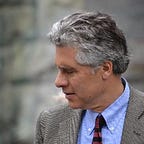Thinking about Utopia Means Deciding What You Think is Important
Ok. That’s kind of obvious. Really, if you are trying to describe the perfect world, it certainly should include some theory about humanity and the purpose of human existence.
This has been an obsession recently, mostly because Chris Colbert and I are working hard on the final section of his forthcoming book “Technology is Dead.” The book is fundamentally about how humans need to find our way through this threatened, global shit-show that we have created with our technology, and why. At bottom, these problems require hard thinking about what bits of the human experience technology can help and what bits it threatens to destroy and which bits are worth fighting for, metaphorically speaking.
Much of my utopian exploration has centered on Ruter Bregman’s “Utopia for Realists” and Holden Karnofsky’s explorations in his “Cold Takes” podcast, as well my own writing on the challenges of Techno-Utopianism
Karnofsky’s podcast is great for those of us with short attention spans. In less than 20 minutes he covers the importance of having a positive vision of the future, our current preference for dystopian views, and the lameness of most utopian visions, which, he says, “sound dull…, homogeneous… and alien.” Not that the elimination of poverty or ignorance or the establishment of free love or guaranteed happiness might not be good to have, it’s just that the core features of many utopian visions feel entirely too static and dead.
This insight goes to current research suggesting that happiness is not a thing, but a byproduct of what we do, primarily the quality of our relationships and our sense of accomplishment. Note that this is similar to the assessment offered by Viktor Frankl in his highly influential work, “Man’s Search for Meaning.” Frankl posits that those who lived through the concentration camps found meaning in their desire to care for some other or to complete some work or societal contribution or, in the absence of either of those two possibilities, simply to demonstrate that they could survive with dignity.
It’s worth emphasizing that these are not states of being, but processes — the process of knowing and caring for another is never “complete,” nor is one’s life’s work. There is always more to learn and do and the research is highly suggestive that this process of learning and doing is the core of human existence.
The implications for utopias are pretty obvious. Any ideal state for humanity will be not a state at all, but a platform for the ongoing process of discovery that seems to be our purpose as humans. Certainly David Deutsch makes this case very powerfully in “The Beginning of Infinity” — that humans are built to develop explanations using a process that is creative, infinite, and approximate.
In short, humans strive for progress and without the potential for progress, any utopian vision will feel empty and stale. This is where the techno-utopians are almost certainly right — we are driven to solve problems and then to solve the problems those solutions create and on and on into infinity.
So, utopia might be simply the freedom to envision the next utopia and the ability to work on bringing it into fruition.
This comes close to where our book “Technology is Dead” may end up. Technology, it seems, is particularly good at enabling that creative process — providing the required tools and prosperity and platform. But doing it is a human task. So far, at least, technology is not able to envision or create or imagine anything that does not yet exist. Only humans can do that.
And since we have no idea how or why we are able to imagine, we are unlikely to be able to teach our machines to do it anytime soon. Here we start to bump up against concepts of “artificial general intelligence” and the nature of consciousness — an entirely different story. But it is worth pondering that our exploration of utopia has delivered us back to the very thing that makes humans (possibly) unique.
We are able to imagine worlds and ideas that do not yet exist and then work to bring them into existence. That is actual magic.
